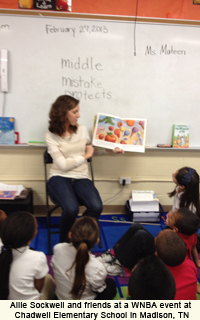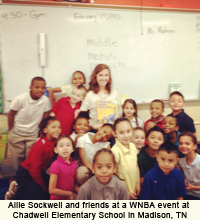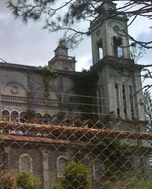Hitting Home
An English major’s internship with the Women’s National Book Association leads to a new understanding of literature
I smooth down the ruffle of my skirt, wondering if I look professional enough—I want to make a good impression when I get to the library. Today is my first official meeting as an intern with the Nashville chapter of the Women’s National Book Association, and I am headed to a discussion held by several of the group’s members. I’ll be talking with women and men who work in the book industry—publishers, teachers, librarians, even authors themselves—and I can’t contain myself. I’m a college sophomore, and I don’t want to stick out among this crowd.
 I don’t know what to expect as I walk up the faded steps and into the library’s corner room, the room used for book discussions. I have no idea what an actual book discussion will be like. In my mind, you must say educated things with big words that make people nod their heads in approval. Certainly you don’t just talk about how the book makes you feel.
I don’t know what to expect as I walk up the faded steps and into the library’s corner room, the room used for book discussions. I have no idea what an actual book discussion will be like. In my mind, you must say educated things with big words that make people nod their heads in approval. Certainly you don’t just talk about how the book makes you feel.
When I arrive, I’m greeted by many of the members. They all ask questions about my college, my major, and my tasks while working with WNBA. “I’m in charge of the social-media sites—you know, Facebook and Twitter—and I write articles and put together the newsletters that are sent out to all of you,” I explain. At first I’m a little stiff, afraid I might say the wrong thing, but after a while I realize that these people genuinely want to get to know me. They welcome me into their group.
As the discussion begins, we take our seats at a circular table next to a sunny window. Around fifteen women are present with books and notes in front of them, eager to discuss the book. For this month, January 2013, the selection is Nothing Daunted: The Unexpected Education of Two Society Girls in the West by Dorothy Wickenden. We begin the discussion with a few facts about the author, just background information. “The author is the executive editor of The New Yorker magazine,” our group leader says. “In this book, she focuses on the idea of new adventures, of stretching past your comfort zone and making a positive impact for those around you.” The discussion begins.
The book—a work of nonfiction—begins in 1916, when two young women raised in New York society decide to do something more meaningful with their lives. They stumble upon the idea of going to Colorado to teach the children of struggling homesteaders. Their task isn’t easy. Elkhead, where the newly-built schoolhouse is located, is covered by snow for six months of the year, and springtime brings mud that’s almost impossible to navigate. Month after month, even through the challenges of this new place out West, the two women (one of them the grandmother of the author) gain confidence and even refer to this time as the best of their lives.
 Their story hits home with many of the WNBA readers; I sit back and listen as many of the members share their own stories or thoughts about the early 1900s and the West. “I remember back then, the West was still viewed as uncharted territory. For two young women to simply up and leave what they knew, they had to have been awfully scared,” one member says. “I admire their courage to seek out new adventures. It makes me want to take more leaps of faith in my own life.”
Their story hits home with many of the WNBA readers; I sit back and listen as many of the members share their own stories or thoughts about the early 1900s and the West. “I remember back then, the West was still viewed as uncharted territory. For two young women to simply up and leave what they knew, they had to have been awfully scared,” one member says. “I admire their courage to seek out new adventures. It makes me want to take more leaps of faith in my own life.”
Another member can relate to the story in a completely different way: “As a teacher myself, I know the struggles of getting to know a particular group of students,” she says. “These ladies rose to the challenge and made an impact on students. I’m sure education was not the top priority for many of the families out West, simply due to the fact that survival came first: finding shelter, food, warmth in the winter.”
As others begin to share their own experiences of moving away from home or of wanting to make a difference, something in my mind clicks: as readers, we are constantly using our own stories to connect to another person. In an English class once, we spoke about the meaning of literature. Why does it exist? Why are we drawn to it? A remark from the professor struck me: “Literature is one person’s attempt to explain what it is like being human.” Outside of the classroom, in an intimate gathering of fellow book-lovers, this idea starts to make sense. Where there is a story, there will be human interest.
A memory from my childhood comes to mind. I remember being fascinated by moths: I was scared even to walk out our front door because the porch light attracted what seemed like hundreds of these odd little creatures. They flocked to any and all sources of light; they could not resist the glow of a light bulb. To me, people are just the same with books. We will cling to stories, learning something new about our own lives, refusing to let go until we read every last word.
Copyright (c) 2014 by Allie Sockwell. All rights reserved.

